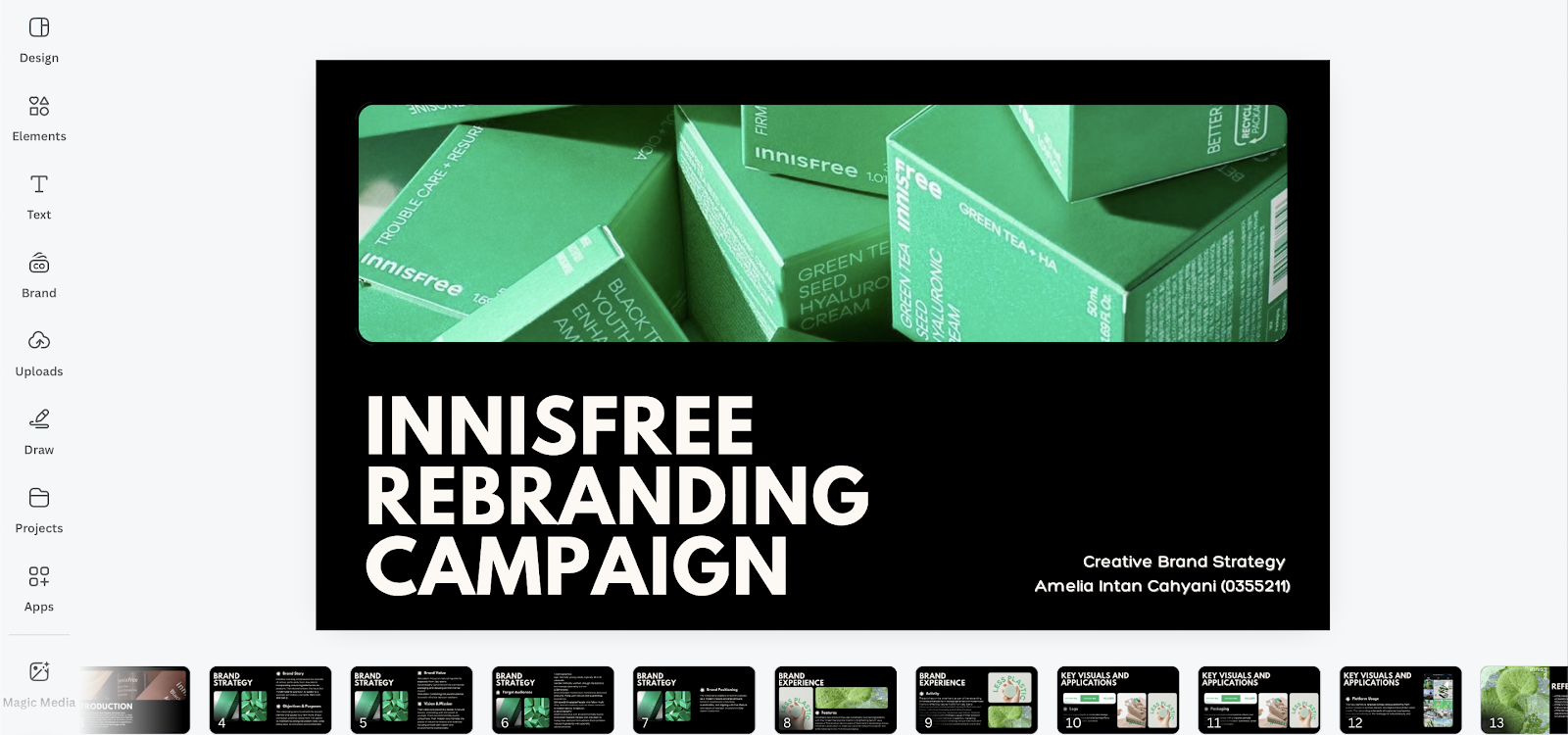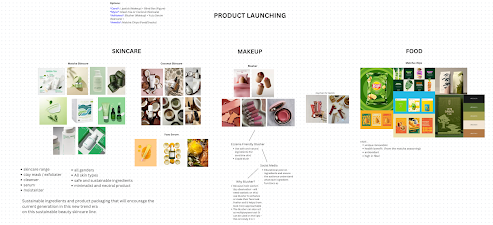Creative Brand Strategy - Task 1A & Task 1B
//2024 - //2024 / Week - Week
Amelia Intan Cahyani/ 0355211
Creative Brand Strategy/ Bachelor of Design (Hons) in Creative Media
Task 1A & Task 1B
Lectures
Week 1: Introduction to the Module
Ms. Lilian gave us a brief overview of what we would be
learning in the first class. This class will cover the
process of creating a brand strategy by utilizing a more
conceptual approach with creative thinking. The following
parts contribute to the course:
-
Developing a Brand's Concept
-
Putting the idea into action
Investigating and identifying the target audience is an
important part of the exercise. Our main goal will be to
comprehend how they interact with the brand and discover
ways to resolve issues for the company while defending our
strategies. Finding the best solution through thorough brand
planning is the goal. To benefit from one another's methods,
it is necessary for us to present our work.
Lecture 02: The Branding Process
-
A brand affects a company's actions,
reputation and customer experience.
-
A brand needs to be flexible enough to grow with the
market in order to succeed.
-
The various stages and positions that fall under the
overall structure of brand development.
 Brand development stages
Brand development stages
-
The brand development process includes formulating
a brand strategy, creative execution, creative
implementation, and brand communication.
-
Campaign: A continual attempt to convey a message
to the audience that typically lasts a longer period
of time.
-
Concept Campaign: A hook or idea that persuades
people to take action.
-
Cause Campaign: Using activist messages, it is able
to benefit society while still increasing revenues.
It promotes a certain ideas, purpose, or cause
rather than a product or service.
-
Event campaigns, also known as experiential
marketing, use virtual or in-person experiences to
teach people about products, services, and
businesses.
-
Launch Campaign: Completes a specified marketing
aim in order to generate attention and build a
reputation.
-
Personality Campaign: Promotes a person's
reputation and career from relative obscurity to
high visibility.
-
SWOT: Strengths, Weaknesses, Opportunities, and
Threats. Aids decision-making for launching new projects,
improving policies, and exploring prospects.
-
Customer Journey Map: Shows the consumer's
experiences with the brand from beginning to
end.
Requirements: Customer points of view,
touchpoints, customer segments
Lecture 03: The Creative Brief
- The competitive frame of reference:
 Competitive Frame of Reference
Competitive Frame of Reference
-
Big Idea: Overarching message that underpins all
elements of a campaign in order to resonate w/ the
large audience
 Big idea
Big idea
Lecture 04: Touch Points
-
Touch points: The interactions and exposures that
customers experience with every brand.
Three steps process:
-
Create a full list of brand marketing activities and
touchpoints as they appear in the customer journey map.
-
Prioritize touchpoints based on their potential impact and
clarity of implementation.
-
On the customer journey map, map the prioritized brand
marketing activities and touchpoints.
Week 1: Introduction to the Module
Ms. Lilian gave us a brief overview of what we would be learning in the first class. This class will cover the process of creating a brand strategy by utilizing a more conceptual approach with creative thinking. The following parts contribute to the course:
- Developing a Brand's Concept
- Putting the idea into action
Investigating and identifying the target audience is an important part of the exercise. Our main goal will be to comprehend how they interact with the brand and discover ways to resolve issues for the company while defending our strategies. Finding the best solution through thorough brand planning is the goal. To benefit from one another's methods, it is necessary for us to present our work.
Lecture 02: The Branding Process
- A brand affects a company's actions, reputation and customer experience.
- A brand needs to be flexible enough to grow with the market in order to succeed.
- The various stages and positions that fall under the overall structure of brand development.

- The brand development process includes formulating a brand strategy, creative execution, creative implementation, and brand communication.
- Campaign: A continual attempt to convey a message to the audience that typically lasts a longer period of time.
- Concept Campaign: A hook or idea that persuades people to take action.
- Cause Campaign: Using activist messages, it is able to benefit society while still increasing revenues. It promotes a certain ideas, purpose, or cause rather than a product or service.
- Event campaigns, also known as experiential marketing, use virtual or in-person experiences to teach people about products, services, and businesses.
- Launch Campaign: Completes a specified marketing aim in order to generate attention and build a reputation.
- Personality Campaign: Promotes a person's reputation and career from relative obscurity to high visibility.
- SWOT: Strengths, Weaknesses, Opportunities, and Threats. Aids decision-making for launching new projects, improving policies, and exploring prospects.
-
Customer Journey Map: Shows the consumer's
experiences with the brand from beginning to
end.
Requirements: Customer points of view, touchpoints, customer segments
Lecture 03: The Creative Brief
- The competitive frame of reference:

- Big Idea: Overarching message that underpins all elements of a campaign in order to resonate w/ the large audience

Lecture 04: Touch Points
- Touch points: The interactions and exposures that customers experience with every brand.
Three steps process:
- Create a full list of brand marketing activities and touchpoints as they appear in the customer journey map.
- Prioritize touchpoints based on their potential impact and clarity of implementation.
- On the customer journey map, map the prioritized brand marketing activities and touchpoints.
Instruction
Task 1(A): Case Study
The first thing I did upon understanding about Task 01(A) from Ms. Lilian was to look for companies that had successfully gone through rebranding. I decided to search for a simple skincare brand that has been rebranded and caught my attention, which is Innisfree, and it's also the brand that I use personally, so it's intriguing for me.
Once I gathered the information, I started to look into pictures of innisfree product that represent its rebranding from instagram then customize the slides to match my campaign for this task. You can view the final slides on final submission section
Task 1(B): Campaign Proposal
You are to propose a Branding Campaign. The campaign will be for a snack of your choosing and may be conceptualized as a rebranding exercise to introduce a new concept or as a new product line launch. The suggested proposal outline: Campaign Description, Brand Story, Objective & Purpose, Brand Values, Vision & Mission, Target Audience, Organizers. SWOTs, Brand Positioning. Furthermore, you are to identify the Brand Touch Points by producing a Customer Journey Map.
Final Submission
Feedback
This presentation shows how you understand this assignment.
You could've put images with greater detail on the slides so that we could better grasp what you are conveying.
For the ideation of Task 1B don't simplify everything, try to explain in more detail.
Try to come up with another idea instead of “fun and playful” because it may not be suitable for all ages.
Don't forget to create a customer journey map.
This presentation shows how you understand this assignment.
You could've put images with greater detail on the slides so that we could better grasp what you are conveying.
For the ideation of Task 1B don't simplify everything, try to explain in more detail.
Try to come up with another idea instead of “fun and playful” because it may not be suitable for all ages.
Don't forget to create a customer journey map.
Reflection
Experience: Working on the Innisfree and Nerds rebranding campaigns has deepened my appreciation for the intricate process of building a brand's identity from the ground up. Creating these campaigns required an empathetic understanding of the target audience, alongside careful research into market trends, competitor analysis, and customer touchpoints. The process highlighted how crucial it is to ensure the brand’s core values resonate with both existing and new consumers. The most significant realization was the complexity of managing a rebrand that appeals across demographics, particularly when aiming for inclusivity in both age and lifestyle.
Observations: In researching successful rebrands like Innisfree’s, I noticed the importance of having a clear vision and staying true to a brand's identity, even while evolving. Innisfree's rebrand prioritized its eco-conscious values, showcasing how sustainability can meet high-end appeal. For Nerds, rebranding as a healthier snack meant learning from how brands redefine themselves in response to consumer trends, like healthier ingredients and environmental responsibility. Observing these approaches helped shape my understanding of maintaining a brand’s integrity while still innovating.
Findings: Throughout the process, I found that a brand’s values must be clearly communicated at every touchpoint, from the website to packaging to social media. In the case of Nerds, identifying the right balance between inclusive visual and health-conscious messaging was key to ensuring the rebrand felt genuine and not forced. Innisfree's clean and minimal aesthetic reinforced its natural and eco-friendly, while the Nerds campaign showed the importance of more inclusive visual approach to appeal to all age groups. I leaned heavily on brand touchpoint strategies, understanding how every interaction whether digital or physical appeal and cohesive brand story that resonates emotionally with the audience.
By reflecting on these campaigns, I’ve learned that successful rebranding isn't about changing everything but refining a brand to meet modern expectations while staying true to its roots.




Comments
Post a Comment